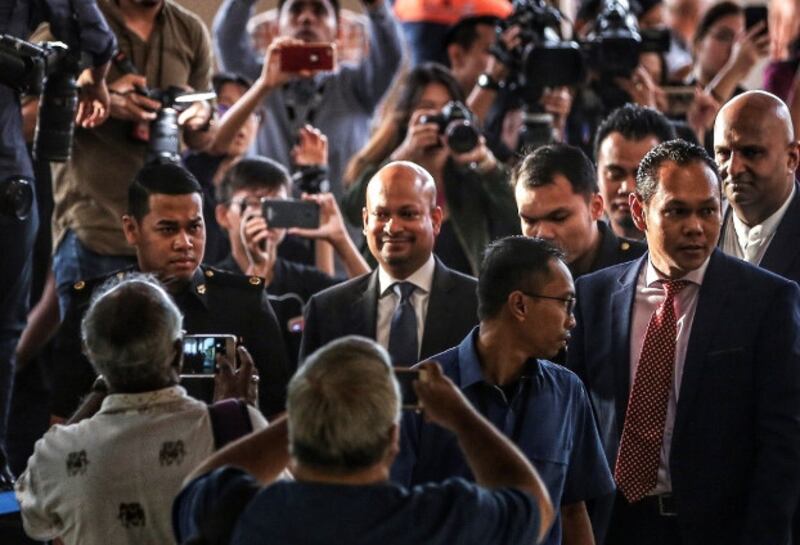Former Malaysian Prime Minister Najib Razak and the former chief executive of 1MDB both pleaded not guilty Wednesday to one charge each in connection with alleged tampering of a 2016 audit into the beleaguered state development fund.
Najib, who is facing 38 other charges relating to a financial scandal around 1MDB, was accused of abusing his position as prime minister to shield himself from legal action by ordering amendments to the 1Malaysia Development Berhad final audit between Feb. 22 and 26, 2016.
Both Najib and Arul Kanda, the ex-CEO of 1MDB, were charged under the Malaysia Anti-Corruption Act of 2009. If found guilty, each man could face up to 20 years in prison and a fine of up to five times the gratification amount.
The allegations against Najib went public on Nov. 25 when Auditor General Madinah Mohamad announced that several parts of the 2016 audit were expunged under the former prime minister's orders.
The expunged sections allegedly included a mention of fugitive financier Low Taek Jho (better known as Jho Low) attending a 1MDB board meeting. Malaysian officials said they wanted to extradite the financier who was charged in absentia earlier this month for his role in the 1MDB scandal.
Najib’s Barisan Nasional coalition was driven from power when it lost the May 9 general election to the Pakatan Harapan coalition led by Mahathir Mohamad, who took over as prime minister and appointed new leadership throughout the government.
Mahathir also ordered the investigation into 1MBD to resume. Previously, the U.S. Justice Department had described 1MDB as the “worst kleptocracy scandal in recent times,” alleging that almost $4.5 billion (18.7 billion ringgit) from the state fund was embezzled and laundered through real estate and other assets.
500,000 ringgit bail
Najib, who arrived at Kuala Lumpur Sessions Court with his son, Norashman, appeared calm while the charge was read by a court official.
"The court allowed bail at 500,000 ringgit (U.S. $119,310) to be paid today," Judge Azura Alwi said.
Before Azura ruled, lead defense attorney Shafee Abdullah argued against lead prosecutor Gopal Sri Ram's request for bail to be double that figure.
Shafee pointed out that Najib and Arul were charged with the same offense, and questioned the disparity in the bail figures. Arul, who appeared earlier before Judge Rozina Ayob where he was charged with abetting Najib in tampering the audit, was granted 500,000 ringgit bail.
Sri Ram argued that Najib was the principal offender while Arul is facing his first charge.
"The principal offender is always treated differently than the abettor. The fact that he had been charged before should not be a privilege," Sri Ram said.
Shafee argued that Najib had paid a total of 5.5 million ringgit ($1.3 million) to stay out of jail since being charged for the first time on July 4 and asked that he face no additional bail.
“If your honor press for further bail that would be oppressive,” Shafee said.

Arul's lawyer, N. Sivananthan, asked Rozina to allow his client to pay the bail in two equal installments of 250,000 ringgit (U.S $59,645) on Wednesday and Thursday.
But Rozina questioned the request.
“He has been unemployed since May, your honor,” Sivananthan said.
The judge was not moved.
"The accused will surrender his passport to the court until the end of the case and the court orders the payment of a 500,000 ringgit bond to be made today," Rozina ruled.
Both men were released and their cases are to resume on Jan. 4.
Speaking to reporters in the courthouse lobby, Shafee said the charge against Najib specifically referred to him ordering the amendment of a draft and should not be considered tampering.
"It was not the final audit report, it was a draft report," Shafee said. "The last few days the allegation was that he tampered, now the prosecution agrees this is an allegation that he directed certain things while the draft report was ongoing."
Since the auditor general’s announcement in November, former government officials including Madinah’s predecessor, Ambrin Buang, have denied her allegations.
Ambrin, who was questioned by the Malaysia Anti-Corruption Commission for seven hours on Dec. 5, maintained there was no tampering in the final audit accepted by parliament in 2016.
Madinah defended her previous comments, saying she had submitted all evidence to parliament's Public Accounts Committee and gave a three-hour explanation to the committee two weeks ago.
